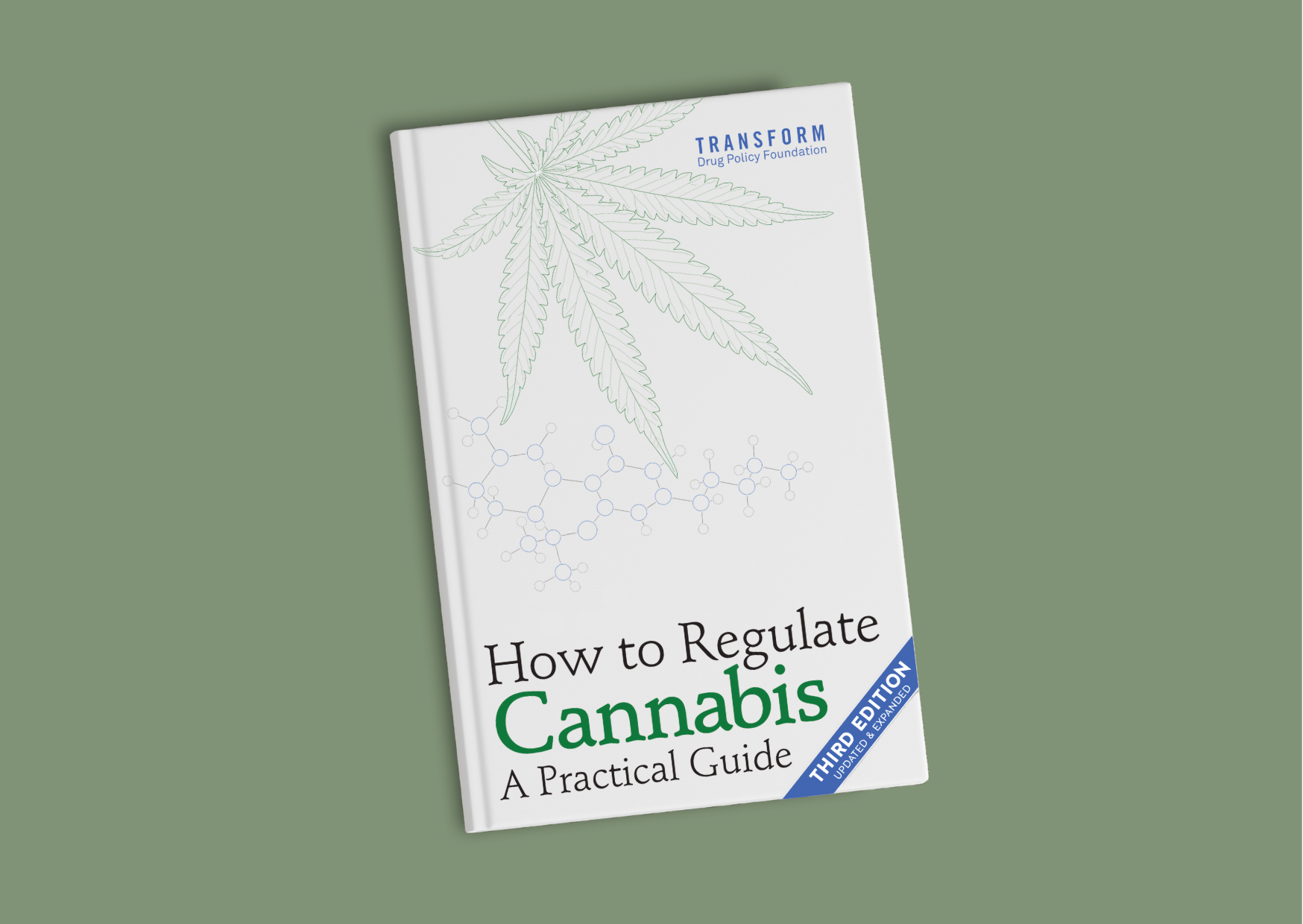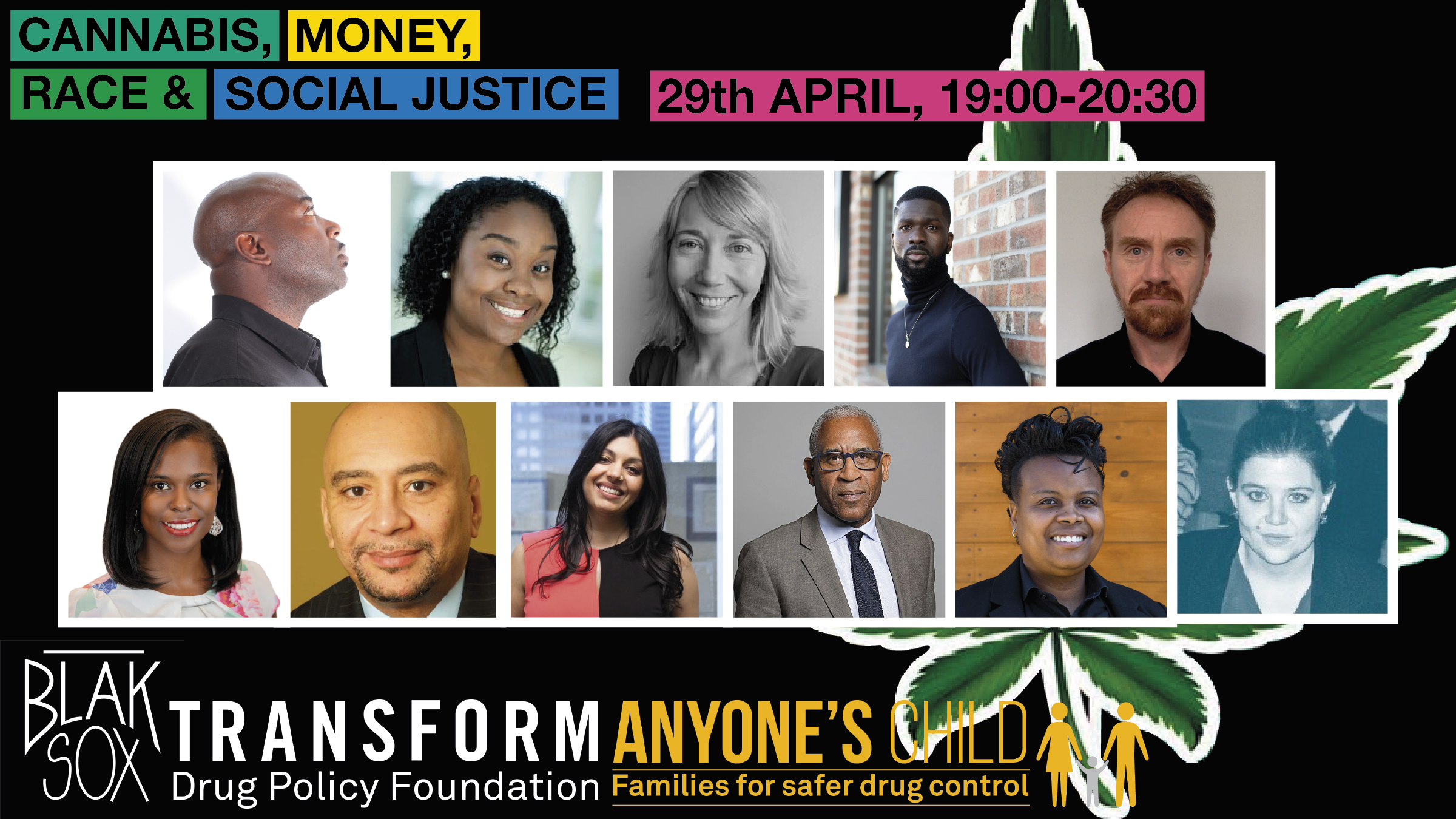4th May 2021
This is an edited extract from the newly updated 3rd edition of 'How to Regulate Cannabis: A Practical Guide'! You can purchase the hard copy for only £15 or access online for free.

Early experiences of cannabis legalisation have brought the issues of social and racial justice to the fore. In the US, fledgling ‘social equity’ schemes have sought to promote market access to communities disproportionately impacted by the war on drugs, or ensure the benefits of the emerging markets are shared equitably and support wider social justice goals in other ways — to varying degrees of success.
In this edited extract of the third edition of Transform’s book ‘How to Regulate Cannabis; A Practical Guide’ we explore key lessons in this rapidly evolving field of policy making.
The dynamics of cannabis prohibition have been different throughout the world, but in each case there have been marginalised communities and vulnerable individuals disproportionately impacted by law enforcement. As non-medical cannabis markets have been rolled out across the US, a key developing theme has been the role of social equity programmes and equitable licensing policies that seek to promote market access to marginalised or impacted communities. Many states have sought to acknowledge the disproportionate harms of cannabis prohibition, faced predominantly by Black communities and people of Latin American descent, through measures that facilitate market access for these communities, and which are also reparative in nature.
The impact of such measures so far has been limited, but practice is still developing and it is clear that this is a key policy concern going forward. Licensing requirements in some Canadian provinces and territories have similarly sought to promote the interests of Indigenous communities, though US-style social equity programmes have not yet been well developed and both Black and Indigenous people remain underrepresented in the fledgling Canadian cannabis industry .[1]
Legal cannabis is a potentially lucrative industry — in terms of both corporate profit and tax revenue — and there is an opportunity, and we would argue a moral responsibility, for proactive measures to ensure these benefits are shared widely, and regulation does not simply recreate the inequities of prohibition. The aim of emerging equity schemes is to ensure that marginalised and disproportionately impacted communities are able to share in the profits of cannabis sales, rather than witness them accumulated by individuals who felt few if any negative effects of prohibition, yet are now in a privileged position to exploit new legal markets. Without positive regulatory action from the outset, market forces with no inherent sympathy for social justice will prevail and those who faced discrimination and criminalisation under prohibition will face exclusion from the regulated market.
Regulation should also seek to prevent risks of corporate capture (an issue explored in more detail in a new chapter in the book ). Small businesses — which social equity applicants will, generally, be — may struggle to gain a foothold in new markets and compete against the economies of scale, market expertise, and legal, financial and lobbying resources of larger established corporate actors. Promoting access to smaller businesses is therefore desirable not only from an equity and social justice perspective, but also to ensure a diverse market space and reduce consolidated corporate lobbying power. These same principles are applicable throughout the supply chain, including at the production stage, where unfortunately patterns of problematic corporate capture are already beginning to develop in some cannabis production industries, notably in Canada. While this discussion focuses on promoting social equity in the context of vendors, it is relevant more generally to regulation throughout the supply chain.
Having identified the groups that vendor regulation should seek to promote market access to (a challenge explored in more detail in the book), the question becomes what measures can be implemented to achieve this. Various barriers are in place to enter the industry, which may be relatively easy for larger corporate entities to overcome, but for small businesses or equity applicants represent substantial hurdles. Barriers may be regulatory, financial, or technical in nature. In each case, there are different measures that regulators can implement to help reduce barriers and promote more equitable industry access. Broadly, these can be split into the following 4 areas:
1. Equitable licensing policies
Regulators determine the amount of licences available, as well as the criteria against which licence applications are assessed. These are important levers to influence the structure of the market and promote a diverse market space. For example, in Nevada, business diversity is ranked and scored when licence applications are assessed,[2] while in Illinois, up to a fifth of points in the application-scoring system for retail licences are available for ‘status as a social equity applicant’.[3] In doing so, regulators are able to level the playing field somewhat and establish equity and diversity as important considerations for licensing. However, when ‘social equity’ is merely a single component of assessment in a scoring system it may be outweighed by other factors. In Nevada, for example, regulators are also required to score an individual on whether they have previously run a business.[4] People from disproportionately impacted areas, or indeed individuals previously convicted of cannabis offences, may be less likely to have run a business previously. There is a balance to be struck between the needs of a licensing process that, by necessity, discriminates according to certain suitability criteria, and the needs of equity goals attempting to level the playing field to support historically disadvantaged individuals or communities.
Social equity ‘points’ can be taken one step further, by establishing the priority review of licence applications for qualifying equity applicants, as has been established in Massachusetts.[5] For its delivery licence types introduced in 2020, Massachusetts blocked out a two year period during which only equity applicants would be able to have applications considered.[6] Such schemes clearly provide a powerful means to allow equity businesses to establish themselves in the market, but may also create tensions with other commercial actors. A similar scheme was implemented in the Massachusetts municipality of Cambridge, introducing a two year initial period during which it would only allow licences for ‘economic empowerment’ applicants. However, this was legally challenged by a non-qualifying applicant hoping to expand to non-medical sales in the municipality, effectively being told that they had to wait. While the challenge was successful at first, it was later overturned in an Appeals court in April 2020.[7]
Social equity schemes may alternatively place the onus on businesses to facilitate diversity. The Marijuana Regulatory Agency in Michigan requires all licence applicants to submit a social equity plan that details a ‘strategy to promote and encourage participation in the marijuana industry by people from communities that have been disproportionately impacted by marijuana prohibition and enforcement and to positively impact those communities’.[8] However, it is not yet clear how successful this requirement will be in practice. While it may improve participation in entry-level roles, it does little to facilitate wider licence applications. Concerns have been raised that privileged licence applicants may have the resources to ‘game’ equity plan criteria and win access without any genuine commitment to the underlying goals.
Limiting the number of licences available per applicant can also be an important way to restrict larger businesses from dominating the market and mitigate risks of corporate capture (conversely, limiting the number of licences available overall may hamper social equity efforts).[9] In Alberta, Canada, for example, individuals or ‘groups of persons’ are not allowed to hold more than 15% of total licences at any one time.[10] In Washington State and Massachusetts in the US, retailers are only allowed up to three licences.[11] Inevitably, businesses may seek to circumvent such rules by purchasing other companies or relying on subsidiaries to submit licence applications, requiring careful attention from regulators to monitor and police financial interests of larger corporate entities. But restricting the number of licences per applicant is an important base-level policy to ensure a more diverse market space.
2. Removing regulatory barriers
Equitable licensing policies will not, however, facilitate the access of smaller businesses by themselves; if financial or technical barriers are still in place, or other regulatory requirements are still too high, then they will still struggle to gain a foothold. Promoting market access therefore requires utilising the full range of powers available to regulators. Promoting social justice and equity should be a key aim of cannabis policy. There may be occasions, however, where legitimate regulatory measures aimed at promoting other key aims can directly or indirectly impact on equity goals. Balancing these key aims is essential, which requires proactively analysing, monitoring and evaluating policy impacts against robust indicators for each key aim. Such a holistic approach to performance-measuring acknowledges that goals will sometimes be in conflict, requiring trade offs and compromises between different stakeholders.
Other potential regulatory barriers may include: requiring individuals to obtain property space before a licence can be awarded; requiring applicants to demonstrate a minimum threshold of financial assets; and requiring applicants to have detailed technical operations and security plans.[12] While arguably justifiable (particularly during the cautious initial rollout of a new market, when regulators are negotiating unchartered new territory under intense political and public scrutiny), many of these regulatory barriers will be much easier for larger, established businesses to overcome — meaning these requirements are indirectly discriminatory against smaller market actors and new market entrants. Requirements for licence applicants to have specified previous retail experience are an example of how such discriminatory practices can become formalised into regulatory structures. Consideration should be given to less stringent requirements for smaller businesses, or providing for such barriers to be more easily negotiated where other regulatory objectives are not significantly compromised.
Again, this is all a balancing exercise for individual jurisdictions based on the information available to them. There is no right or wrong answer, nor is there an exhaustive list of potentially discriminatory regulatory requirements; all requirements may indirectly discriminate against smaller businesses to some extent, and the solution clearly cannot be enforcing no regulatory requirements whatsoever. Instead, this should be seen as an important aspect of performance-measuring, ensuring that policies are measured against all key aims, not simply the aim they purport to assist with.
3. Financial assistance
Financial barriers represent a significant challenge to setting up a business. These include practical costs, like obtaining inventory, securing real estate, hiring staff and implementing operations procedures, but they may also stem from regulatory costs associated with applying for or renewing a licence. If no steps are taken to help small businesses, including equity applicants, then the retail market is likely to become saturated with larger businesses with the financial backing to absorb these initial costs.
Regulatory bodies are able to reduce these barriers through different means of support. In relation to regulatory costs, this may be achieved by waiving some or all of the costs of applying for a licence for certain applicants. Illinois, for example, provides for licence fee reductions of up to 50% in disproportionately impacted areas,[13] while the Marijuana Regulatory Agency in Michigan has reduced licence fees by up to 60% in such areas.[14] Action has also been taken at a municipal level: Portland, Oregon has implemented a scheme which allows small businesses to receive fee reductions when either 25% of their owners or 20% of their staff have a prior cannabis conviction.[15] Full fee waivers are available in some other municipalities across the US.[16]
The high start-up costs for new businesses are often consolidated through business loans. However, in the US, this has been complicated by the fact that, as cannabis remains illegal at a federal level, businesses are often prohibited from accessing bank loans. This absence of banking services has been reported as “effectively blocking nearly everyone but the wealthy and well-connected from getting into and benefitting from what is the fastest-growing industry in the country”.[17] Illinois has sought to mitigate this through a low-interest loan scheme in disproportionately impacted areas, with $30 million of funding, though similar measures are not available in most other states.[18] While the absence of banking services may be a problem unique to legal cannabis jurisdictions in the US, it nonetheless highlights the importance of access to capital to front initial business costs. Smaller businesses are more likely to rely on business loans to overcome initial financial barriers, and the availability of low-interest schemes helps ensure they are able to continue operating in the longer term.
4. Training and technical assistance
Given vendor regulation is seeking to promote access to groups who potentially have not had the opportunity to run a comparable business before, the technical, management, and financial expertise required to operate effectively can present a significant barrier to market entry. Providing technical support and training can go some way to addressing these challenges. In Massachusetts, the Cannabis Control Commission is “charged by state law...with ensuring the meaningful participation in the cannabis industry of communities disproportionately affected by the enforcement of previous cannabis laws”, as well as “small businesses, and companies led by people of color, women, veterans, and farmers”.[19] It operates a broad social equity programme targeted at all levels of the industry — those seeking to run a business themselves; those looking for managerial work; as well as entry-level positions. Eligibility for the Massachusetts programme requires a past drug conviction (of any kind), residence in a disproportionately impacted area for five of the past ten years or being the spouse or child of someone with a past conviction. The programme provides training, technical assistance and mentoring, aiming to reduce barriers to entry and is a leading example of how to provide a comprehensive and meaningful approach to promoting social equity in the cannabis market.
Los Angeles City has also developed a programme that offers priority application processing and business support to disproportionately impacted individuals.[20] However, it has been heavily criticised as leaving equity candidates on an “indefinite waiting list”, while “fewer than 20 of the 100 businesses on track to receive a license through the program appear to be black-owned, according to estimates from advocates”.[21] This highlights that even the most well-intentioned schemes need to be effectively implemented, or risk providing little assistance at all.
For more discussion on cannabis and social justice check out the video of the recent event to launch Transform's new partnership with Blaksox

This is an edited extract from the newly updated 3rd edition of 'How to Regulate Cannabis: A Practical Guide'! You can purchase the hard copy for only £15 or access online for free.
References
1. Maghsoudi, N. et al (2020) How Diverse is Canada’s Legal Cannabis Industry? Examining Race and Gender of its Executives and Directors, Centre on Drug Policy Evaluation.https://cdpe.org/publication/how-diverse-is-canadas-legal-cannabis-industry-examining-race-and-gender-of-its-executives-and-directors/
2. Government of Nevada (Undated) License application form, example available: https://tax.nv.gov/uploadedFiles/taxnvgov/Content/FAQs/Score%20Sheet%20-%20Organizational%20Structure%20(Identified).pdf.
3.Illinois Department of Financial and Professional Regulation (Undated) License application information. https://www.idfpr.com/FAQ/AUC/FAQ%20-%20Adult%20use%20license%20for%20new%20dispensing%20organizations_.pdf; Illinois Department of Commerce & Economic Opportunity (Undated) Illinois Adult-Use Cannabis and Social Equity. https://www2.illinois.gov/dceo/Pages/CannabisEquity.aspx
4. Government of Nevada (Undated) License application form, example available: https://tax.nv.gov/uploadedFiles/taxnvgov/Content/FAQs/Score%20Sheet%20-%20Organizational%20Structure%20(Identified).pdf
5. Commonwealth of Massachusetts, Cannabis Control Commission (Undated) Guidance for Equity Provisions. https://mass-cannabis-control.com/wp-content/uploads/2018/04/FINAL-Social-Provisions-Guidance-1PGR-1.pdf
6. Hanson, M. (2020) Massachusetts marijuana delivery license applications on track to launch in May, reserved for economic empowerment and social equity applicants, Mass Live 7/5/20. https://www.masslive.com/marijuana/2020/05/massachusetts-marijuana-delivery-license-applications-on-track-to-launch-in-may-reserved-for-economic-empowerment-and-social-equity-applicants.html
7. Levy, M. (2020) Appeals court judge smacks down an injunction, good news for city’s favoring of small pot sellers, Cambridge Day 24th April. http://www.cambridgeday.com/2020/04/24/appeals-court-judge-smacks-down-an-injunction-good-news-for-citys-favoring-of-small-pot-seller
8. Government of Michigan (2019) Michigan's Marijuana Regulatory Agency Releases Emergency Rules. https://www.michigan.gov/marijuana/0,9306,7-386-89871-501189--,00.htm
9. Joint Legislative Audit and Review Commission (2020) Report to the Governor and the General Assembly of Virginia: Key Considerations for Marijuana Legalization, Commonwealth of Virginia, p75. http://jlarc.virginia.gov/pdfs/reports/Rpt542.pdf
10. Province of Alberta (2018) Gaming, Liquor and Cannabis Act: Gaming and Liquor Amendment Regulation, s106. http://www.qp.alberta.ca/docum..
11.Washington State Liquor and Cannabis Board (Undated) Frequently Asked Questions about the Marijuana Rules. https://lcb.wa.gov/mj2015/faqs-rules; Commonwealth of Massachusetts, Cannabis Control Commission (Undated) Guidance on Types of Marijuana Establishment Licenses. https://mass-cannabis-control...
12. Joint Legislative Audit and Review Commission (2020) Report to the Governor and the General Assembly of Virginia: Key Considerations for Marijuana Legalization, Commonwealth of Virginia, p76. http://jlarc.virginia.gov/pdfs...
13. Hansen, C (2019) Illinois Lawmakers Approve Marijuana Legalization, US News 31st May. https://www.usnews.com/news/national-news/articles/2019-05-31/illinois-lawmakers-approve-marijuana-legalization; Illinois Department of Commerce & Economic Opportunity (Undated) Illinois Adult-Use Cannabis and Social Equity. https://www2.illinois.gov/dceo/Pages/CannabisEquity.aspx; Government of Illinois (2019) Adult Use Cannabis Summary. https://www2.illinois.gov/IISNews/20242-Summary_of_HB_1438__The_Cannabis_Regulation_and_Tax_Act.pdf; Government of Illinois (2019) House Bill 1438 Illinois Cannabis Regulation and Tax Act, Article 7: Social Equity in the Cannabis Industry. http://illinoiscannabisinfo.com/hb1438-article7
14. Government of Michigan, Department of Licensing and Regulatory Affairs (2019) Michigan's Marijuana Regulatory Agency Announces Social Equity Program Expansion. https://www.michigan.gov/lara/0,4601,7-154-89334_79571_79784-508912--,00.html.
15. The City of Portland, Oregon (2018) Social Equity Program. https://www.portlandoregon.gov/civic/article/69841
16. See, e.g., Government of Long Beach (Undated) Open an Equity Business. http://www.longbeach.gov/citymanager/cannabis-information/cannabis-social-equity-program/open-an-equity-business
17. Krane, K. (2018) Lack Of Cannabis Banking Hurts Average Small Business Owners, While Wealthy Entrepreneurs Flourish, Forbes 13th June. https://www.forbes.com/sites/kriskrane/2018/06/13/marijuana-banking-constraints-disproportionately-harm-small-businesses/#675f41ce54ed
18.Hansen, C (2019) Illinois Lawmakers Approve Marijuana Legalization, US News 31st May. https://www.usnews.com/news/national-news/articles/2019-05-31/illinois-lawmakers-approve-marijuana-legalization; Illinois Department of Commerce & Economic Opportunity (Undated) Illinois Adult-Use Cannabis and Social Equity. https://www2.illinois.gov/dceo/Pages/CannabisEquity.aspx; Illinois Government (2019) Adult Use Cannabis Summary. https://www2.illinois.gov/IISNews/20242-Summary_of_HB_1438__The_Cannabis_Regulation_and_Tax_Act.pdf; Government of Illinois (2019) House Bill 1438 Illinois Cannabis Regulation and Tax Act, Article 7: Social Equity in the Cannabis Industry. http://illinoiscannabisinfo.com/hb1438-article7/
19. Commonwealth of Massachusetts, Cannabis Control Commission (Undated) Guidance on Equitable Cannabis Policies for Municipalities. https://mass-cannabis-control....; Commonwealth of Massachusetts, Cannabis Control Commission (Undated) Equity Programs. https://mass-cannabis-control....
20. City of Los Angeles Department of Cannabis Regulation (2019) Social Equity Program. https://cannabis.lacity.org/licensing/social-equity-program-2
21. Levin, S. (2020) 'This was supposed to be reparations': Why is LA's cannabis industry devastating black entrepreneurs? The Guardian 3rd February. https://www.theguardian.com/us...;




